Itzik the Clown: "If You Knew How Healthy Your Smile Is, You Would Never Stop Laughing"
The wonders of laughter, the personal psychologist, memorable encounters, unforgettable dramas, and unusual hours: Itzik Ozeri reveals in an interview what gives him the strength to wake up every morning with a small song in his heart. Small but mighty.
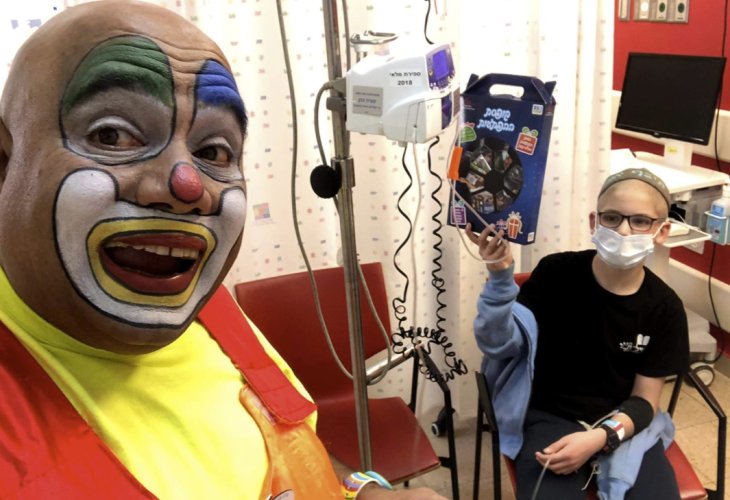 Itzik Ozeri
Itzik OzeriHe always surprises with a big smile and pulls out another new and interesting toy from his suitcase. His name is Itzik the Clown, and many visitors to children's wards across the country know him because you simply can't miss him. In an interview with Hidabroot, he reveals a bit about the inner turmoil that burns inside him and everything that happens behind the mask.
Yitzhak Ozeri (56) is married, a father of three, and a grandfather to one granddaughter. He is considered today the veteran clown in the State of Israel. He has been in this role for about 35 years, 28 of which have been full volunteer work at Schneider Children's Hospital in Petah Tikva. "I do it for Hashem," says Itzik, adding, "My reward is the smile I manage to get from the children, who sometimes lie for days without consciousness or desire for anything. No one can take that reward away from me."
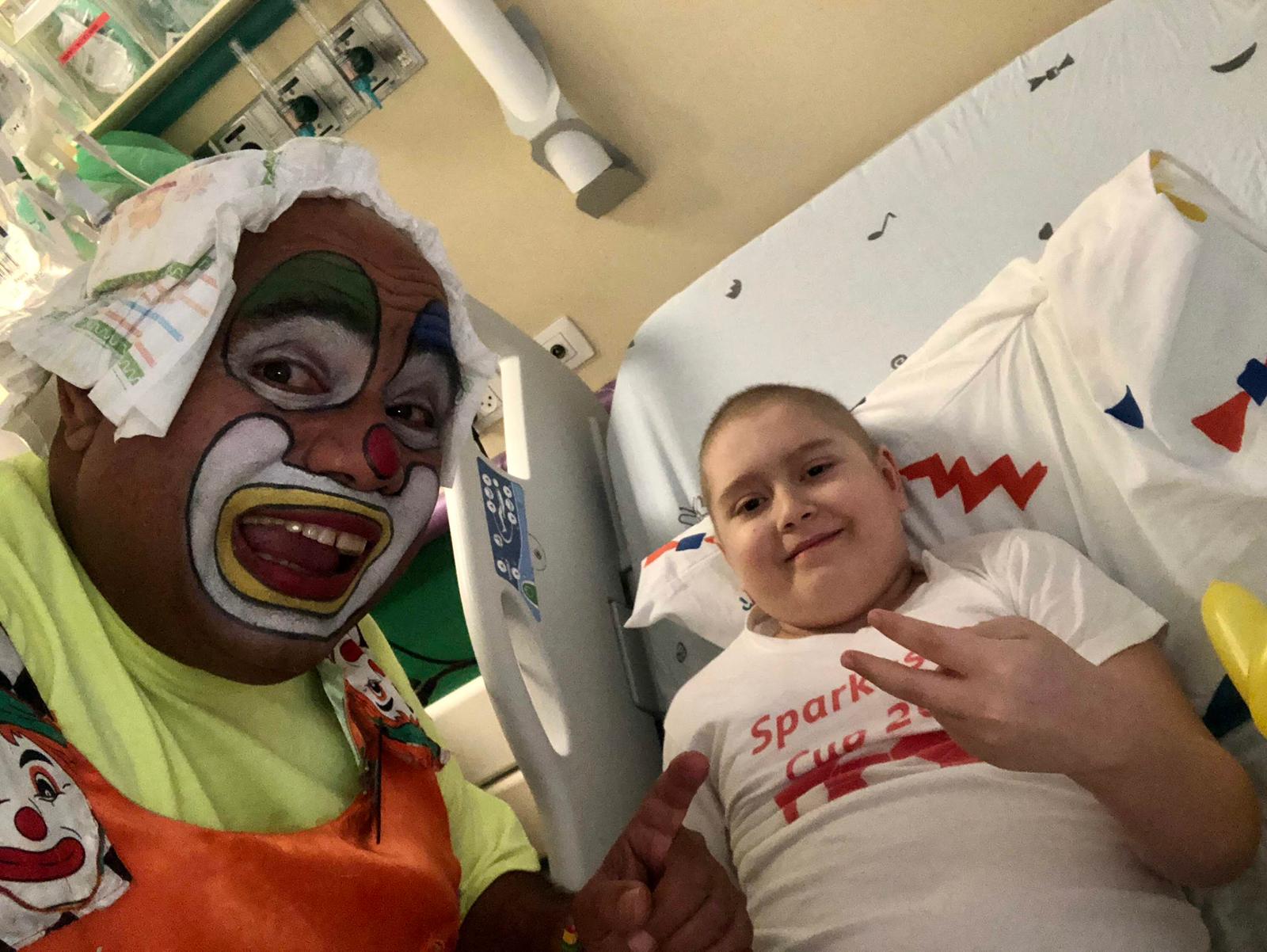
Medical clowning is a field within alternative medicine in hospitals and medical centers, performed by special clowns known as "medical clowns," utilizing the therapeutic power of humor to improve the quality of life, functionality, mindset, feeling, and condition of patients. In the first decade of the 21st century, medical clowns were employed in medical institutions worldwide, including Israel. Medical clowns have different names: in the United States, they are called "clown doctors," though they are not doctors; in Israel, they are known as "medical clowns" or "ge'lologists," and in Europe, by various names such as "special clowns," "hospital clowns" in French.
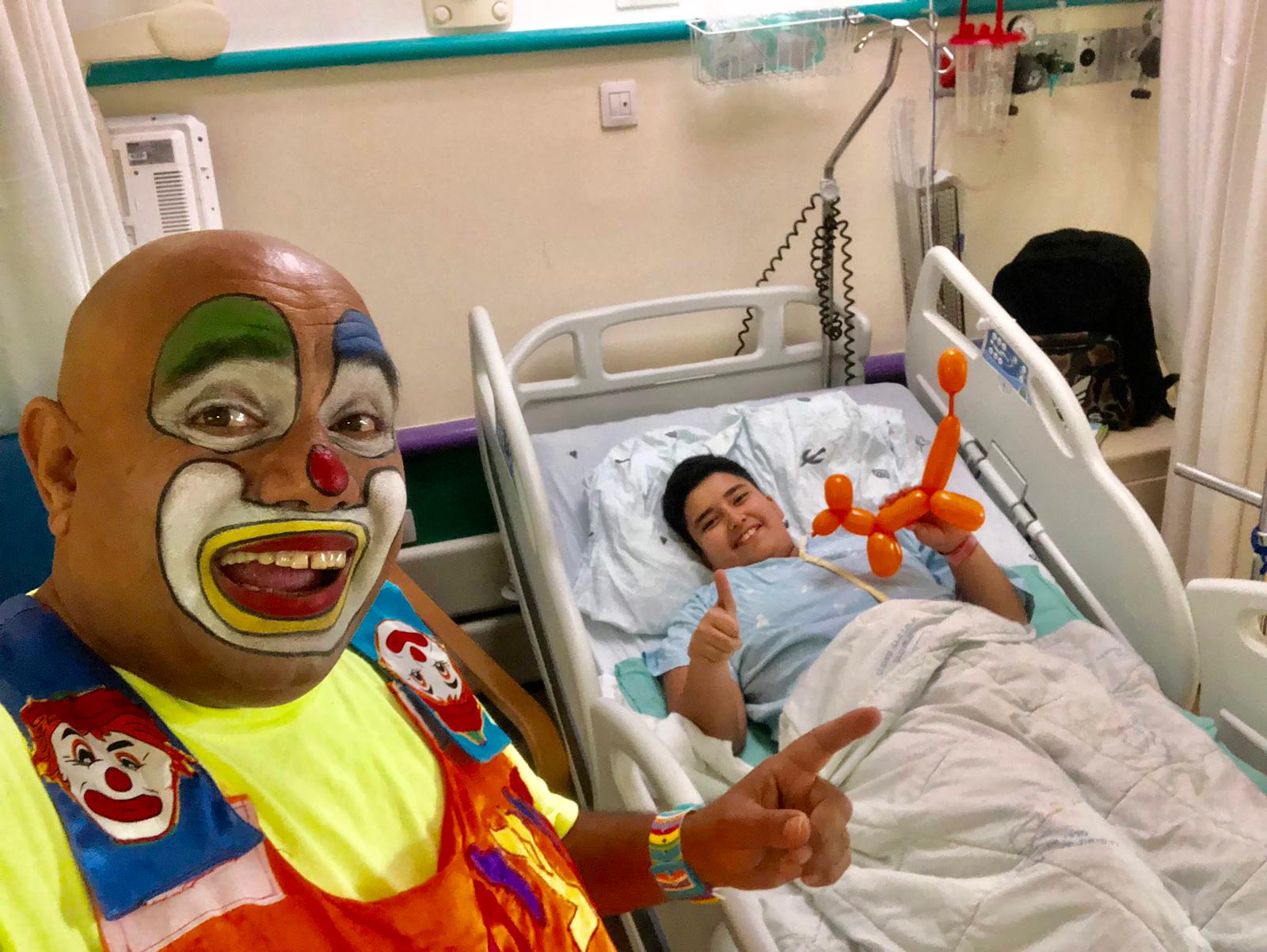
Clowning Heals
The role of medical clowns is to attend to the mental and social needs of hospitalized patients. They distract patients during painful and frightening medical processes, helping them adapt to hospital life. The fun and clowning atmosphere helps patients forget their suffering for a while and relieves the tension they are in. Medical clowns use their skills to provide children with doses of fun to help them cope with emotions they may experience during hospital stays, such as fear, worry, boredom, and loneliness. The healing powers of humor and laughter have been proven in several studies to aid in relaxation, reduce pain, and enhance the likelihood of undergoing various medical processes, accelerating patient recovery.
Itzik passionately describes the importance of clowning in the medical field: "Not once or twice, in the middle of a family meal, I receive an urgent call from the hospital about a child who refuses to take his medicine, and his life is in danger. I leave everything, the family, and the event, and rush to the hospital. These calls can come in the middle of the night and even during family celebrations and important events."
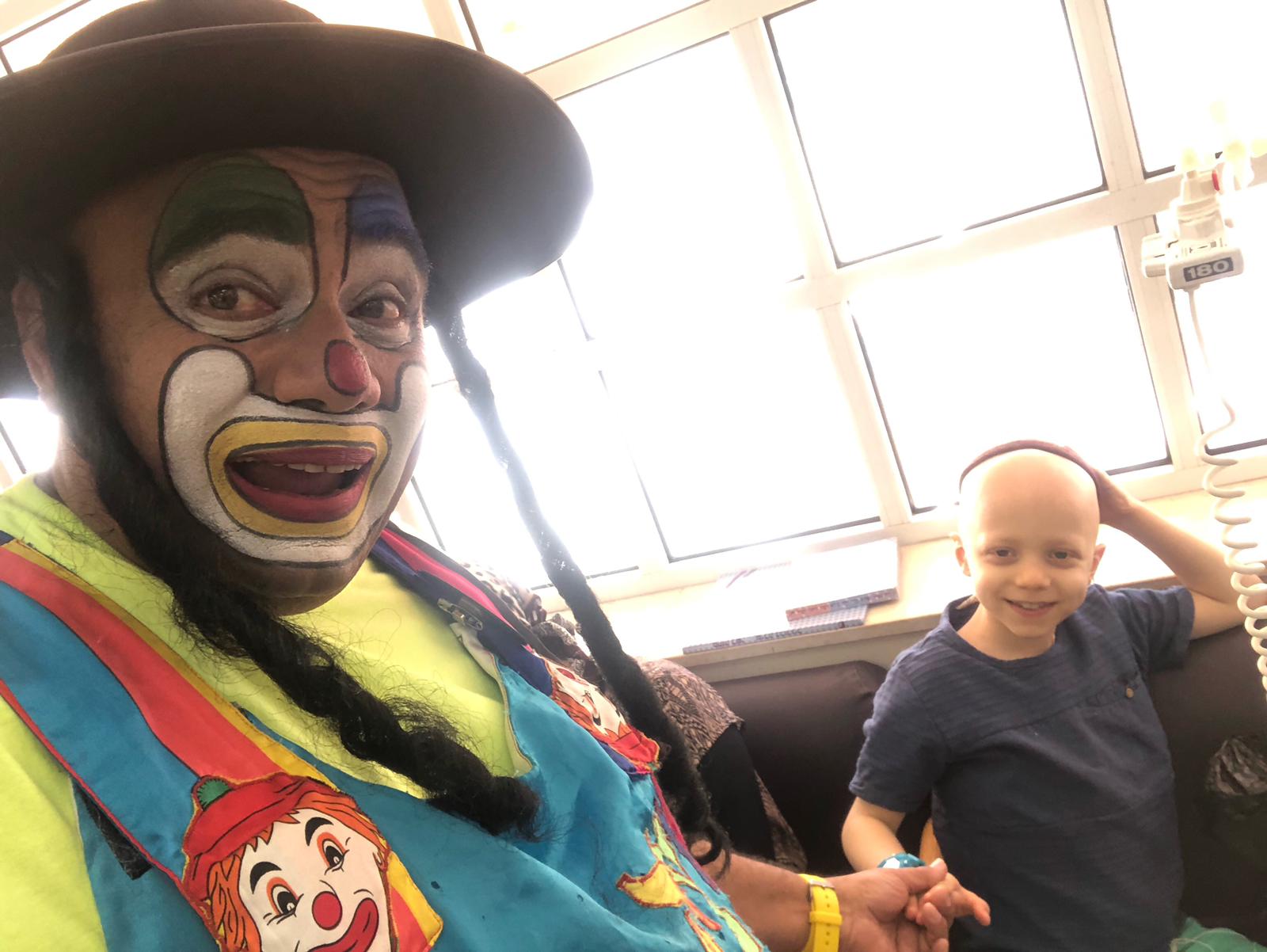
What's your secret to success?
"I claim that each of us has a hidden clown inside his soul, and in my role, I just make sure that this hidden clown comes out."
Itzik proves his point: "Did you know I also teach clowning?" he asks me. "But what does it matter if you teach?" I asked. "Listen to the end," Itzik tells me, "My students in clowning, they aren't neighborhood clowns or generational clowns. They're senior professors, managers of large companies, CEOs, and the toughest people in the country. They reached the realization that if they want to advance in the world, they must smile and be happy. They cannot connect and succeed with stern faces. You wouldn't believe how they arrive, deeply in the parking lot, they hide their suits, look left and right, put on tracksuits or any sportswear, disconnect their phone for three hours, and learn how to be clowns, or more precisely, how to release the clown hiding within them. These are people who never disconnected their phones, and with me, they do for several good hours."
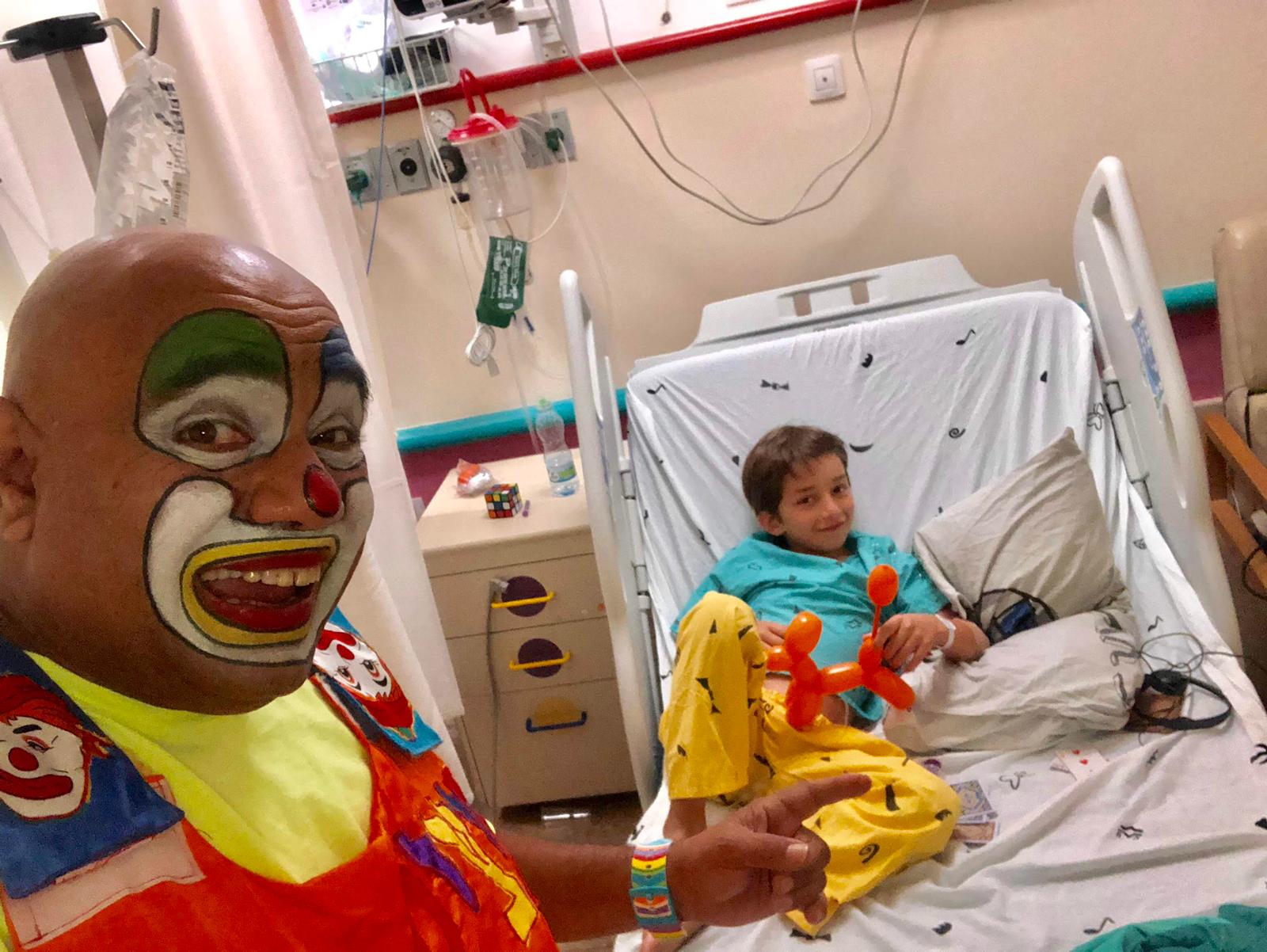
If People Knew the Power of Clowning - They Would Hold It Tight With Both Hands
Itzik the Clown knows how to extract from every child the smile that brings back the light, and at the same time, returns hope to their parents and breathes life. "If people knew how powerful clowning is, they would hold it tightly with both hands." I have many stories with me, let me share a few. A few years ago, a small child was in a very difficult situation. When he was taken off the ECMO machine, the doctors expected him to come around. The child indeed opened his eyes, but no more than that. He didn't communicate, and there was a great concern in the air. Professor Uvadi Dagan, head of Thoracic Surgery, told the team that exactly for such situations, there is Itzik the Clown. When the child's father heard this, he said, 'What a clown now? Only Hashem can help.' Professor told him: 'Of course only Hashem, but Itzik the Clown is His messenger.' They immediately called me, I started to pull out my suitcase full of nonsense, and lo and behold, the child woke up. A few days later, he left the ICU for the regular ward, and then came the stage where he was supposed to get out of bed, but he refused in any way. The persuasion attempts by doctors, nurses, the physiotherapist, auxiliary staff, and the family were of no avail. They immediately called me. Before I entered, I said: 'Sh'ma Israel', 'In the name of Hashem, we will do and succeed', and I entered the room. I started making jokes here and there and dubbing the child. He, of course, refused to hear about the idea of getting out of bed. I went to the doctors' room and brought a doctor's chair with wheels, thinking that perhaps the ordinary wheelchair was intimidating him. I began the task. I told the child that there was a giant aquarium in the corridor with fish, and I don't like to go and see them alone, would he agree to come with me? To everyone's surprise, he agreed. We strolled with the doctor's wheelchair to the aquarium, and there we started to fool around with the fish, and without him noticing, I took him off the wheelchair. As we were busy with the fish, exactly then a nurse from the ward passed by, and I signaled her to take the chair, and then I said to the child: 'Wow look at that? The nurse stole our chair, let's run and catch her before she disappears.' We started the chase, me and the little child who just ten minutes ago refused to get out of bed. We were running after her, and she was running towards the ICU. There the door opened, and before us stood the entire medical team, who just a few days ago almost gave up. They began to cry, just couldn't believe their eyes. A process that should have taken three weeks, happened in half an hour. Two days later, the child went home.
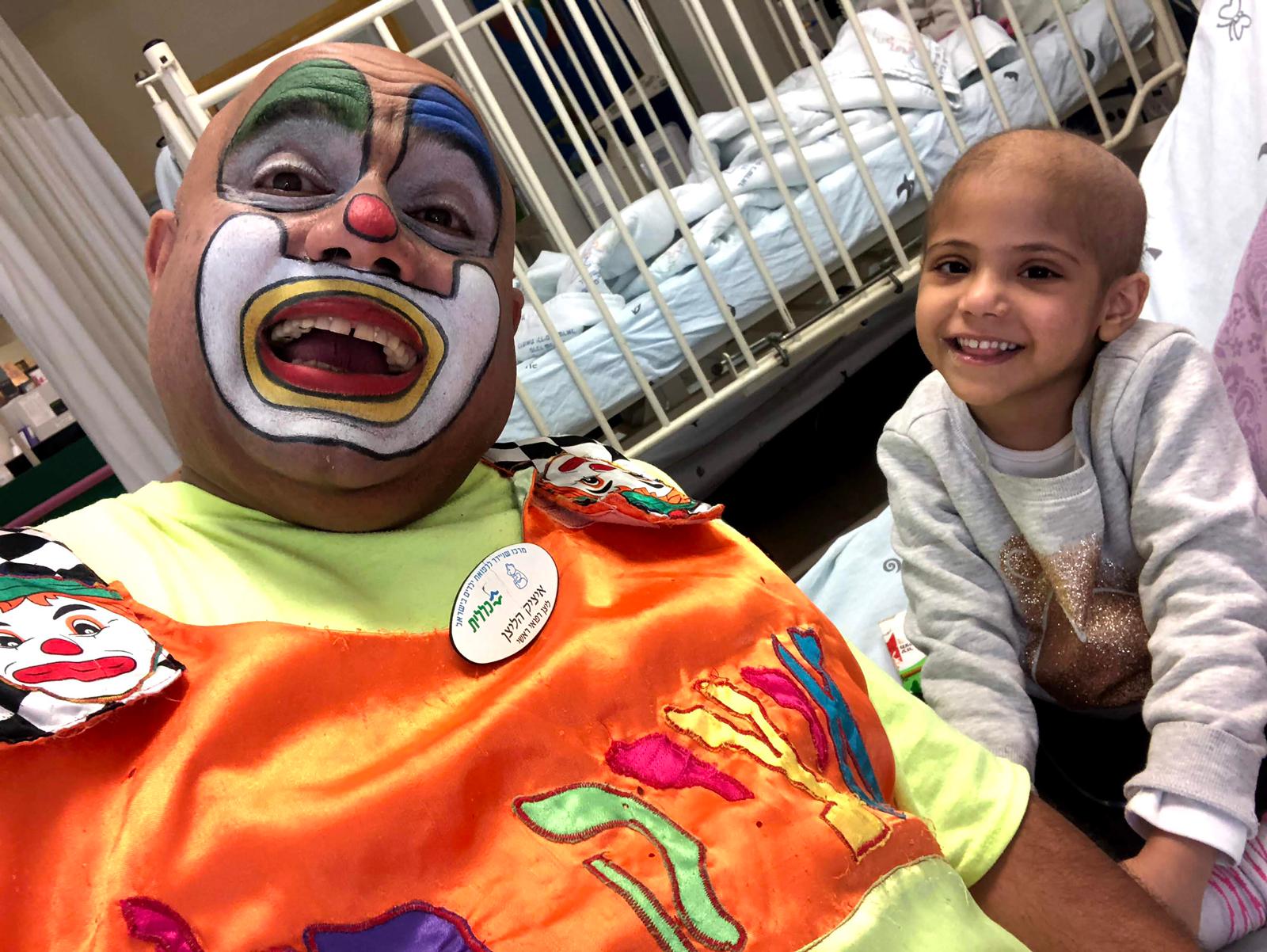
Itzik takes a breath before revealing something personal to me: "I have a psychologist I visit regularly. My psychologist loves me very much, so much so that he doesn't even charge me for the advice and the time he devotes to me." I remain silent in amazement, and Itzik breaks the tension: "My psychologist's name is Hashem. I always talk to him, and he always answers me. The answers he provides me usually come immediately."
His Personal Psychologist
For example, what do you ask your psychologist?
"One day, as I was recharging my energy, on a Sunday evening, by the sea, when I'm alone, and only the stars are watching me, I turned to my psychologist and asked him: why did I become Yitzhak Ozeri the clown? Why didn't I become a rabbi, a millionaire, a doctor, or a pilot?!" The answer I received came immediately the next morning, on Monday morning, a day when I usually visit the oncology ward. My volunteering is divided into days and departments, explains Itzik casually. "On Monday, I'm in the pediatric oncology ward. On Wednesday, I'm in the operating rooms, accompanying children to anesthesia and recovery, and on Thursday, I'm in the ICU, in the surgical and thoracic and cardiac surgery sections. So, on another routine Monday, I enter the oncology ward on the 7th floor at Schneider, and there my psychologist, Hashem, decided to give me the answer. There is a sick girl who has been in room 2 for a long time, and whenever I arrive, her father is in the middle of prayer with a tallit and tefillin, we've never exchanged a word. That day when I entered, he was in the same position again, but this time he stops me and starts talking to me, telling me that just before I came here, there was a doctor's round with all the ward's doctors, and the head of the department, Professor Yaniv, then I appeared at the entrance of the ward. He tells me that he heard the head of the department saying to all the doctors, 'Now that Itzik the Clown has arrived, we won't interrupt him, we'll skip the first rooms and come back to them later.' 'Do you understand how important your activity is,' the father tells and continues, 'Yesterday my daughter suffered terrible pain all night, she slept only half an hour. Even morphine didn't help her anymore. But what held her was that she told me: 'Isn't it true that tomorrow is Monday and Itzik will come with his suitcase?'"
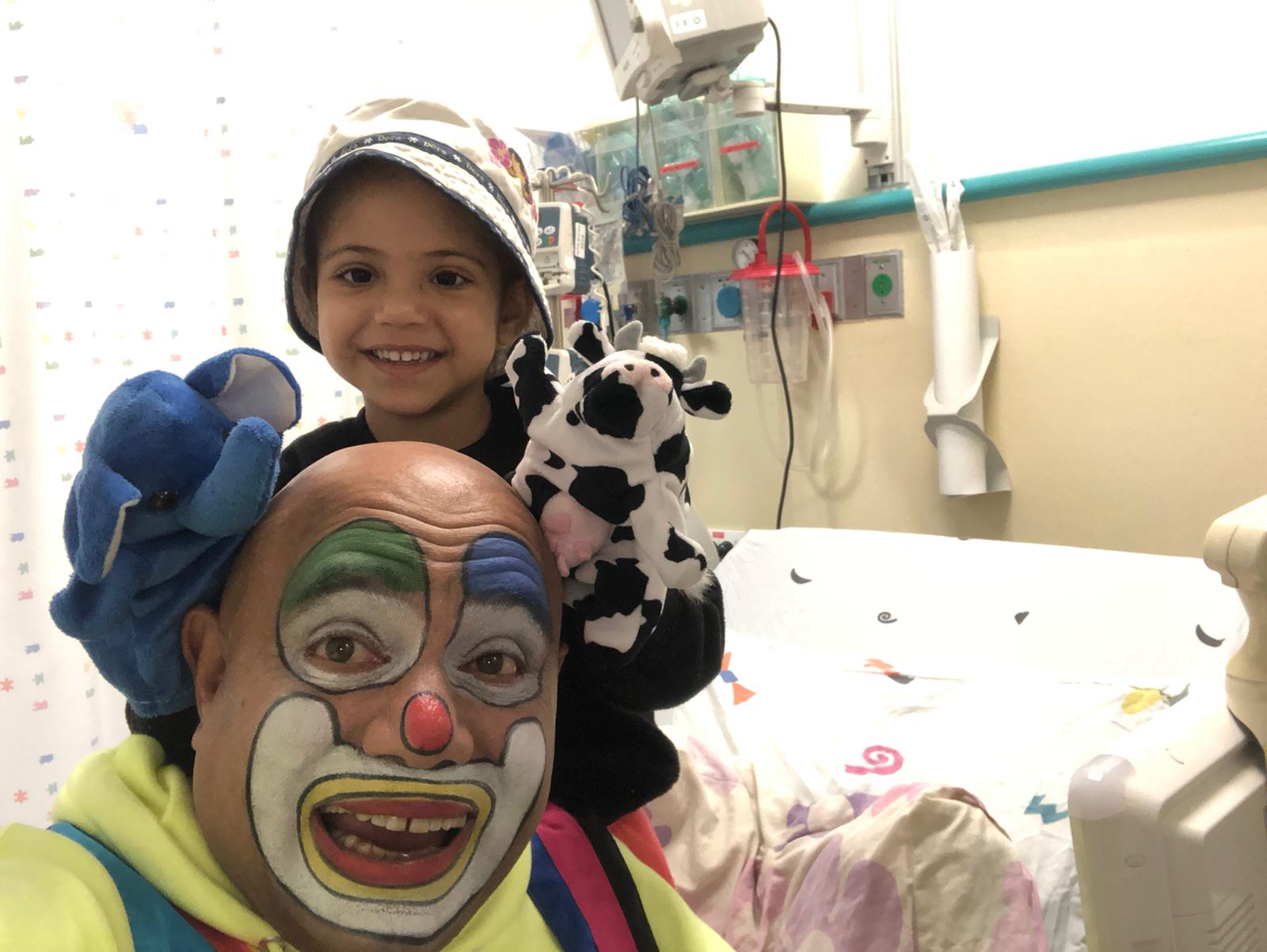
"The father continues, 'I feel the need to tell you a few things. Your name is Yitzhak Ozeri, your profession was determined even before your birth, and your mother received the inspiration to name you Yitzhak. Because the root of Yitzhak is tzachak, which means makes laugh. The root of Ozeri is ozer, helping people. You make people laugh and help them get through the toughest times in their lives. Your name starts with a Yud, and your family name ends with a Yud, which is the name of Hashem. It is written in holy books that someone whose name begins and ends with a Yud is not an ordinary person, but an angel in the form of a person sent to do good deeds. Your profession is a clown. If we reverse the letters, it reads 'Natzil' (to save). Your life's mission in the world is to save people and children, and you are part of the world to come.' These are the words of the girl's father. 'I asked him, how do you know I'm part of the world to come?' He immediately pulled out the Gemara in Tractate Ta'anit, page 22a: Rabbi Beroqa was in the marketplace, and Elijah the prophet was with him. One day he asked Elijah, is there anyone in the market who is part of the world to come? Elijah pointed out two Jews who were people of the world to come. Rabbi Beroqa approached them and asked, what is your occupation? They told him they were two joyful people who make sad people happy. The father told me, this is my proof that you are part of the world to come.' I understood from this whole story that Hashem, my psychologist, gave me an answer to my question from last night. If I were a millionaire, a doctor, a pilot, it's not certain that I would be a person of the world to come, but as a clown who makes sad children and parents happy, happy am I that I am one of the world to come. This gives me the strength to wake up the next morning with a new song in my heart. Even if there is pain, I paint on a face, smile, and arrive."
Itzik the Clown emphasizes that all his activities in hospitals are entirely volunteer-based, and from this arises the natural question, what do you live on?
"Many people ask me, 'Until when will you be the sucker of the State of Israel? Why do you do everything voluntarily?' I want to tell all of them, I am not a sucker, not in the direction. When I see children smiling, and the strength it gives when I enter with my nonsense, not only does it strengthen them, but also their parents who are equally broken. Then I understand I am not a sucker, it's a privilege not everyone has."
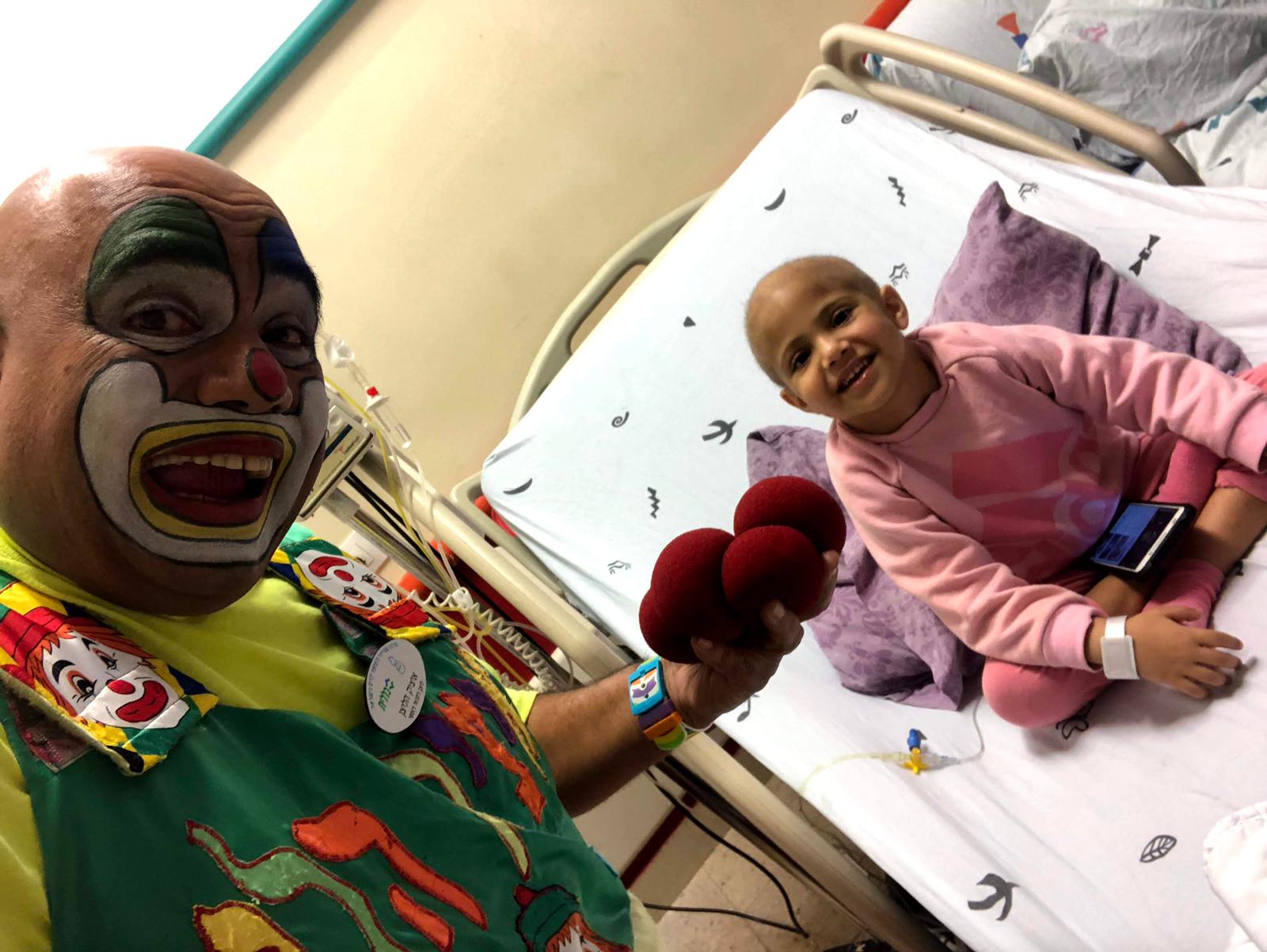
But with all due respect to you, with this insight and the children's smiles, you can't buy milk at the store?
"That's a bit of a redundant question. A person's needs are predestined from one Rosh Hashanah to the next. Whoever believes this with full faith will lack nothing. Blessed is Hashem, I have bread to eat, clothes to wear, and a bed to sleep in, I say thank you. I do not seek to be a millionaire, only sustenance for existence, and blessed is Hashem, he always sends the livelihood in his ways, and believe me, he lacks no ways."
In conclusion, Itzik the Clown wishes to convey a message: "This year, I'm unsure if I will merit to be in the synagogue on Yom Kippur. But wherever I may be, I will put the tallit on my head, and talk to Hashem. I tell Him, 'Look at the smile of this child, and the joy of this girl, the happiness of these parents. Because of this, grant me and all of Israel redemption and salvation soon, to escape the situation we are in. Amen."

